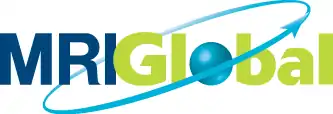MRIGlobal
MRIGlobal is an independent, not-for-profit, contract research organization based in Kansas City, Missouri, with regional offices in Maryland and Virginia. In addition to its own research laboratories, MRIGlobal operates research facilities for the Department of Energy and the Department of Defense.[1]
 | |
| Formerly | Midwest Research Institute |
|---|---|
| Type | Nonprofit scientific research institute |
| Industry | |
| Founded | Kansas City, Missouri (June 17, 1944) |
| Founder | Kansas City-area business leaders |
| Headquarters | 425 Volker Boulevard Kansas City, Missouri, United States |
Area served | Worldwide |
| Services | |
Number of employees | 550 (in FY13)[1] |
| Website | www |
MRIGlobal addresses some of the world’s greatest threats and challenges. Founded in 1944 as an independent, not-for-profit organization, MRIGlobal performs contract research for government, industry, and academia. Customized solutions for national security and defense and health include research and development capabilities in clinical research support; infectious disease and biological threat agent detection; global biological engagement; in vitro diagnostics; and laboratory management and operations. MRIGlobal is one of two partners in the Alliance for Sustainable Energy, LLC, which manages and operates the National Renewable Energy Laboratory (NREL) in Golden, Colorado, for the U.S. Department of Energy. For more information, visit mriglobal.org
MRIGlobal offers internal and client biological laboratory research. For decades, MRIGlobal expertise has led biosafety and biorisk management program development in the U.S. and internationally. Credentialed safety experts are at the forefront of MRIGlobal's efforts to remain compliant in its own facilities, while providing relevant, up-to-date site assessments and training around the world.
"Our mission is to use science and technology for a safer, healthier, more sustainable world."
History[2]
Foundation
Founded in 1944 during World War II as Midwest Research Institute, the organization's initial mission was to find a way to convert the ammonium nitrate military ordnance plants in Galena, Kansas, Parsons, Kansas, DeSoto, Kansas and El Dorado, Arkansas to peaceful uses of creating fertilizer. Among the nine founders was Kenneth A. Spencer who would make a fortune from the Jayhawk Plant in Galena. Spencer would be chairman of the Institute from 1954 to 1957, and donated money for the Kenneth A. Spencer Laboratories Building and the Spencer Auditorium at MRIGlobal.[3]
MRIGlobal was located initially in the former Westport, Missouri City Hall at 40th Terrace and Pennsylvania. That building was torn down in 1955 at which time MRIGlobal moved into its current Kansas City headquarters, facing the Nelson Art Gallery, and adjacent to University of Missouri - Kansas City and the headquarters of Russell Stovers candy.[4]
Rapid expansion
MRIGlobal obtained its first contract with NASA in 1961 and its first U.S. Arms Control and Disarmament Agency contract in 1964. In the 1970s, the organization began working for the U.S. Environmental Protection Agency developing tests to detect and measure pollutants.[5]
Expansion and growth continued in the 1980s. In 1982, a venture group was created to commercialize MRIGlobal’s inventions. Major projects included engineering lightweight thermoelectric cooling devices for U.S. Army aircraft. This technology earned an R&D 100 Award, and was used in Operation Desert Storm to keep flight personnel cool while operating in warm climates.[6]
Throughout the next two decades, MRIGlobal expanded its operations, adding locations in Palm Bay, Florida, in 1999; Rockville, Maryland, in 2002; and Frederick, Maryland, in 2003.[6]
In January 2015, MRIGlobal powered their first-ever online detection database, CBRNE Tech Index.
Projects[2][9]
- Coating process for M&M Candies permitting the coating of 3,300 pounds (1,500 kg) of chocolate centers every hour (1950s)[10]
- Soluble coffee for J.A. Folger a forerunner of auto drip coffeemaker (1950s)[11]
- National Renewable Energy Laboratory (managed since its start in 1977 as MRIGlobal is part of the Alliance for Sustainable Energy) (1970s)
- Maintaining the National Cancer Institute Repository (since the 1980s)
- Development of a thermoelectric cooling system for flight personnel and astronauts (1990s)
- Ethanol conversion process for the entire corn plant (cob, stalk and leaves—not just the kernels) (in conjunction with NREL and DuPont) (2000s)
- Advanced air sampler to detect trace levels of DNA from anthrax spores (2000s)
- Producing an HPV vaccine for Phase I clinical trials (2010s)[9]
- Supporting the National Institute of Neurological Disorders and Stroke (NINDS) in the development and manufacture of drug candidates for ultimate use in clinical trials (2010s)[9]
- Custom designed and fabricated two Containerized Bio-Containment System (CBCS) units for the United States Department of State with private funding from the Paul Allen Ebola Program to serve as flyable medical transport units with full biocontainment for patients with Ebola or other types of highly pathogenic organisms (2010s)[12]
- Providing electricity to a remote island village in Tanzania through a 60–80 kWp PV battery-diesel hybrid minigrid (2010s)[9]
References
- "MRIGlobal 2013 Annual Report" (PDF). mriglobal.org. Retrieved 2014-07-21.
- "History brochure" (PDF). MRIGlobal. Archived from the original (PDF) on 3 November 2013. Retrieved 1 November 2013.
- "Search KU Finding Aids". Ead.diglib.ku.edu. Archived from the original on 2006-09-02. Retrieved 2011-03-01.
- "Index". Westporthistorical.org. Archived from the original on 2008-05-09. Retrieved 2011-03-01.
- Everly, Steve (August 19, 2014). "MRIGlobal: An institution on the edge". Kansas City Star. Retrieved August 19, 2014.
- Kimball, Charles N. (1985). Midwest Research Institute: Some Recollections of the First 30 Years, 1945–1975. Kansas City, MO: Midwest Research Institute.
- Twiddy, David (March 1, 2001). "Midwest Research Institute changes name to MRIGlobal". Kansas City Business Journal. Retrieved March 1, 2001.
- "MRIGlobal Launches CBRNE Tech Index™". www.mriglobal.org. Retrieved 2015-07-21.
- "MRIGlobal 2015 Annual Report" (PDF). mriglobal.org. Retrieved 2016-03-16.
- "MRI Breakthroughs". Mriresearch.org. September 11, 2001. Archived from the original on July 2, 2008. Retrieved January 15, 2010.
- Everly, Steve (August 19, 2014). "Midwest Research Institute, now MRIGlobal, has been making its mark for 70 years". Kansas City Star. Retrieved August 21, 2014.
- Tom Paulson. "Paul Allen Foundation supports new Ebola evacuation scheme". Humanosphere. Retrieved November 11, 2015.